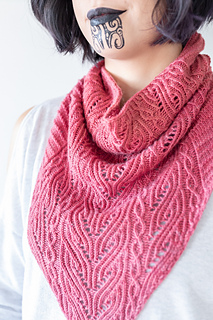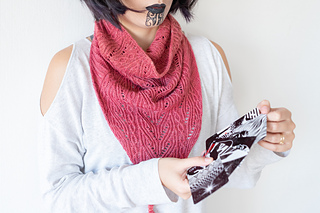patterns >  Aroha Knits
Aroha Knits
> Whakairo Cowl






































Whakairo Cowl
Pay What Works: In an effort to find a balance between more financial accessibility and sustainable pricing, I now offer a “Pay What Works” model. This allows for financial flexibility while still valuing and respecting the work and energy I and others provide in the making of this pattern. The price shown on Ravelry is the “true” value of the pattern that best reflects the work put into creating this design.
To purchase the pattern at a price point that is more accessible to you, use the coupon code at checkout listed next to the price point. The prices indicate the price you will pay, not the discount amount. No coupon code is needed for the highest price point.
AROHA1 - $6.00
AROHA2 - $7.20
AROHA3 - $9.60
NO CODE - $12.00
Please note for those located in Europe that VAT is applied at checkout.
Other ways to support my work is through leaving a tip via Ko-Fi, or becoming a supporter via Patreon.
Whakairo is the art of wood carving in Maori culture, a prominent and respected role. Many traditional structures, such as the posts of wharenui (meeting houses) or the prow of a waka (canoe), and objects like the taiaha (weapons) are covered in this elaborate carved decoration. While it is a work of art, the carvings also tell a story. Whakairo requires patience and diligence and is a skill that many Maori continue to hone to both honour their heritage and carry the stories and lessons embedded in the carving forward.
Knitting, like whakairo, requires patience and diligence. I use knitting, specifically knitwear design, to honour my heritage and carry the stories, values, and lessons of my people forward. I wanted to create a piece to pay tribute to this art form, which I was able to recreate the feel through the usage of twisted stitches and cables for a fabric rich in texture.
On a personal note, some members of my family are wood-carvers, using their talents to decorate wharenui and marae.
The Whakairo cowl is worked bottom-up, starting at the cast-on tip, growing as a triangle until the desired width is achieved, then worked straight up to form the body around the neck. Buttons and buttonholes are then attached so you can close the piece. There are options to work the body in the round for a buttonless version or to turn it into a shawl.
PATTERN INFORMATION
YARN
- 382 - 440 yd./360 - 400 m
- Fingering/4-ply Dubai Knits Yara (80% Merino, 10% Cashmere, 10% Nylon; 440 yd./400 m; 100 g). 1 skein in Damask.
- This yarn has incredible stitch definition which really allows the cables and twisted stitches to pop and shine.
NEEDLES
- US 5/3.75 mm size or size needed to obtain gauge.
GAUGE
- 24 sts x 40 rows per 4 in./10 cm in main stitch patterns with suggested needle size and after blocking.
- One repeat of the center lace pattern (23 sts and 12 rows) equals 3.5 in./9 cm by 1.5 in./4 cm.
NOTIONS
- Five 21 mm buttons
- 6/0 (3.5mm) crochet hook
- Darning/tapestry needle
- Sewing needle and scrap yarn for buttons
SIZING
- Width: 23 in./58.5 cm; Length: 22 in./56 cm.
Note: in the photos I am wearing a kirituhi stencil. Kirituhi was initially developed so that non-Māori could get “Māori-inspired” tattoos. For Māori, they are used for kapa haka performances and for wāhine to feel empowered—I use it as a forward expression of my cultural heritage without violating the specific mana and tikanga of tā moko. The mana of kirituhi is safe to wear as it is purposefully made to be a “generic” design.
Māori — Native people of New Zealand
Kirituhi — A Māori-inspired tattoo or marking
Kapa haka — Dance performance
Wāhine — Woman
Mana — Authority
Tā moko — A traditional permanent marking of the body and face
This pattern has been tech edited and test knit to ensure that the pattern is as clear, correct and consistent as it can be. However small details can still slip us by so if you have a pattern support question, send an email to fdanoy@arohaknits.com and we’ll get back to you within 24-48 hours.
23 projects
stashed
13 times
- First published: February 2019
- Page created: February 22, 2019
- Last updated: January 31, 2026 …
- visits in the last 24 hours
- visitors right now





